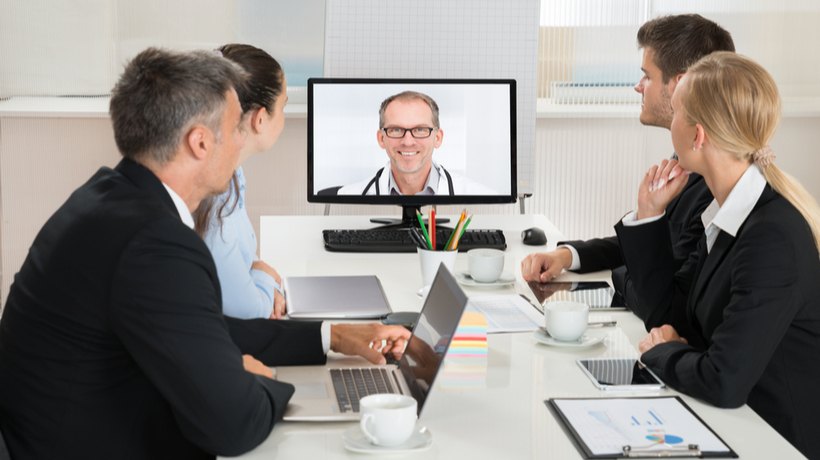Important Facts About Empathos And Its Video eLearning Program
U. S. clinicians in behavioral health and substance abuse services regularly treat suicidal people. But most have little or no training in the evidence-based practices shown to improve patient outcomes. That is why Empathos designed and launched a program to give these clinicians easy access to the training they need. The free eBook LMS Buyer’s Kit presents how Empathos designed a radical video eLearning program that trained clinicians on proper suicidal patient treatment techniques.
The Challenge
A few years ago, the American Association of Suicidology deemed that eLearning was a viable solution for bridging the life-threatening gap in professionals’ continuing education for suicide risk assessment, management and treatment. The main reasons for that were its easy access, self-paced design and affordability. However, practitioners face two huge barriers to receiving it. The first barrier was that there are only a handful of Evidence-Based Practices that are rigorously research-validated for improving outcomes in suicidal people. The second barrier was that there were no online resources available.
The Solution
Empathos’ founder and CEO, Denise Pazur, recognized the serious gap in the proper training of professionals. She also saw how eLearning could easily address that gap. Denise decided to bring the best EBPs to practitioners via a video eLearning format. The result was Empathos’ first four-hour video eLearning course. At the core of the course lied CAMS, the Collaborative Assessment and Management of Suicidality.
CAMS is a suicide specific clinical intervention that practitioners can apply to effectively assess, treat and manage suicidal patients. It targets social workers, mental health and substance abuse practitioners, marriage and family therapists, psychiatrists, psychologists, case managers and more.
“Prior to our online course, clinicians wanting to learn the CAMS Framework had to attend in-person didactic training. This was inefficient, limiting and resource-intensive. So, we chose to use a video-based format instead”, Pazur said. “Clinicians today want ‘Show me’ versus ‘Tell me’ training. It’s rare that clinicians can watch a professional of Dr. Jobes’ caliber in session with a suicidal patient. These experiential scenarios are priceless”.
“Seeing is believing. Data and case studies provide good info. But clinicians really need to see what you’re talking about,” Dr. David Jobes, CAMS’ developer, said. “We were excited to do something different because clinicians can connect with video better. And if it’s done properly, it should yield better results than live training because of its affective engagement.”
Pazur added “Video is the best format for conveying an emotional experience, which improves learning engagement and knowledge retention. Another reason that we chose to do a video-based eLearning course is because we had the resources ready to deploy with seasoned SMEs as our talent. We also had a competent team of videographers, instructional designers, graphic designers, branding experts, sound engineers and motion picture editors, most with 25+ years of experience.”
The assets required to create this course were not insignificant. There was an overwhelming need for professionals who treat suicidal people to actually see how a trained, expert clinician effectively engages with patients to mitigate risk. The benefit for the clinician was that they could see and experience the system they practiced.
Program Goals
The primary goal for Empathos was to change clinician behavior. They wanted to deliver an evidence-based treatment that’s been shown to more rapidly resolve suicidality. “We wanted to move beyond the didactic, lecture-based training that’s ineffective at changing clinician behavior, to a more accessible and interactive video forum. One that highly motivates viewers to learn something they can retain and use to improve patient outcomes,” Pazur commented.
Their primary goal of changing clinician behavior led to a secondary, but highly significant goal. That goal was the reduction of training and treatment costs for healthcare systems. In-person training costs average around $1,500 per clinician-learner. However, the Empathos four-hour video eLearning course costs only $159 per learner.
Psychiatric hospitalization for suicidality can average at $10,000 per patient. Alternatively, treating suicidal patients in an outpatient setting with the CAMS Framework costs around $3,000 to $7,000 savings per patient. Given that more than 40,000 Americans die by suicide each year, and more than 650,000 receive emergency room treatment for an attempt, employing an evidence-based outpatient treatment such as the CAMS Framework can generate enormous savings for health systems, taxpayers and communities. A final program goal was to raise the bar for the training industry at large by delivering highly engaging video learning with exceptional production value.
Program Design
Empathos wanted to produce its video-based eLearning as realistic as possible to garner a genuine emotional connection, response and understanding from learners. “We’ve heard time and time again from clinician-learners that they rarely get to see an expert clinician in session with a suicidal patient”, Pazur explained. “So, we decided to present Dr. Jobes and a patient in a real-life clinical situation with multiple camera angles and cuts to give viewers a true ‘fly on the wall’ experience”.
Before shooting, Empathos invested significant resources into the Instructional Design of the eLearning program. They ultimately divided it into six units and made it heavily video-based so learners would be more engaged and informed. In addition to presenting real-life scenarios between a provider and patient, Empathos supplemented these videos with interactive activities and exercises to test knowledge gain. That enabled them to keep the learning audience’s interest and to help them retain their newfound knowledge and skills. In addition, it inspired behavior change.
Empathos’ SMEs insisted that the training for their video eLearning program be unscripted. Having both worked with suicidal patients over the course of their careers, Dr. Jobes and professor Stephen O’Connor, PhD were confident in role-playing the scenes, basing their interaction on real-life experiences in clinical settings with patients. In fact, few retakes were necessary because they hit the mark so well. Not only did this save Empathos time and money, but it also enabled them to create an unscripted, true-to-life scenario.
Ultimately, they wove together one coherent story of a person dealing with their suicidality over 12 weeks of CAMS in an outpatient setting. The result was similar to a weekly television series, following the patient’s progress and setbacks in each episode. “We wanted to draw viewers into a realistic story of a highly lethal suicidal patient. We also wanted to demonstrate on video how to engage and treat the patient with empathy, collaboration and honesty, all within an outpatient setting”, Pazur said.
They shot all of the videography in three intensive 10-hour days. Empathos’ goal was to create the highest production value possible, similar to that of a network TV show. “We needed to teach empathy as the cornerstone of successful treatment. Often, clinicians don’t have compassion and understanding for the suicidal desire. So, if we only used one camera angle, for example, our role players’ reaction, nuances and facial expressions wouldn’t have been conveyed as well to the learner”, Pazur explained.
“Some training videos look like they were shot with a security camera. There’s no intimacy, no close-ups, the lighting is poor and they use straight shots that don’t draw viewers in”, Dr. Jobes commented. “In fact, one training we viewed had subtitles because the sound engineering was so poor! Talk about undermining the value of that video. The voices’ inflection, tone and influence were lost. Thus, we were inspired not to repeat the same mistakes”.
That’s why Empathos spent so much time planning the video’s logistics: selecting sites and sets, testing camera shots and angles and exploring the right lighting. The result was a new level of quality, detail and nuance for training videos. “You can see the faces of our role players so clearly, you can truly read their emotions”, Pazur remarked.
Empathos also employed a resource-intensive editing process. They spliced together different camera angles, scenes and B-roll to create a cohesive, compelling storyline with a television-quality look and feel. In addition to their compelling, high-quality video, Empathos developed an overarching Instructional Design strategy to reinforce message clarity. The result was editing 30 hours of video into 30-second to three-minute segments, each tied to a CAMS clinical concept. This bite-sized video approach allowed Empathos to add activities that tested knowledge gain, and bolstered learner engagement.
Program Delivery
Empathos reviewed several of the top Learning Management Systems. The company chose the ExpertusONE LMS platform to run their video eLearning program for several reasons, thoroughly analyzed in the LMS Buyer’s Kit. To begin with, the ExpertusONE LMS had an easy to use and access user interface. “Usability was key because our learners don’t have time to take training on how to use an LMS. So, we selected ExpertusONE since it has the best, most intuitive UI. Our learners can quickly locate, register and consume their training. They can also take assessments and collaborate with peers via its robust social features”, Pazur explained. The ExpertusONE LMS also has a native mobile app that allows Empathos’ learners to view video training from their phone or tablet, whether they are online or offline. So, it makes learning-on-the-go incredibly easy.
The second reason why Empathos chose ExpertusONE for its video eLearning program was because of its excellent scalability and global reach. “The course is currently being used in seven U.S. states and two Canadian provinces. We’re also getting inquiries from Australia, Asia Pacific and South America. This rapid growth requires multiple languages and platform scalability. So, a cloud LMS allows us to quickly and easily extend the program’s reach, as well as update course content and release new programs”, Pazur remarked.
In addition, the ExpertusONE LMS was video-friendly, and that was the third reason why Empathos chose it. Modern LMSs, like ExpertusONE, were built on and for the cloud, so they are the ideal hosts for video formats. ExpertusONE also boasts exceptional reporting tools as seen in the free eBook LMS Buyer's Kit. It has multiple ways to measure video content success. That includes built-in assessments and surveys, learning plans that can bundle content and advanced reporting tools that track usage and test results.
“Because Dr. Jobes is so focused on research that substantiates his work, we saw value in that too. We can offer a course to train clinicians. But whether they’ll change their behavior and their patients’ lives, that’s a whole different story”, Pazur remarked. “Also, government and healthcare system funding to support this kind of training is only available if behavior change can be shown. So, it’s critical that our eLearning gets results, and that’s why we set out to report and validate this program rigorously.”
Measuring Results
In addition to using ExpertusONE’s robust reporting program to measure results, Empathos enlisted university-based evaluators to determine if learners integrate the CAMS Framework into their clinical practice. Pilots were launched in Texas and Oklahoma’s public mental health systems. The ExpertusONE LMS is currently gathering results data and Empathos’ university evaluators will also periodically follow-up with the CAMS-trained clinicians post-training to determine a few things. First, they wanted to see if they're implementing the eLearning in their practice. Second, the implementation should be in accordance to the CAMS Framework. Third, Empathos intended to check if employing CAMS with at-risk patients is improving their health outcomes.
Empathos will then update their video training program based on these findings. Additionally, Empathos will gather feedback from learners’ managers, clinical supervisors and those overseeing Empathos training contracts to determine their preferred LMS reporting insights, and then deliver customized reports to them.
Program Results
Within a few months of launching their video eLearning program, Empathos has contracted with seven state programs and healthcare facilities in two Canadian provinces. Learner feedback has also been very positive and speaks to the transformative impact that this asynchronous training is having in behavioral healthcare systems.
“Our primary goal was to change clinician behavior so they deliver CAMS as an evidence-based treatment to suicidal patients. They could thereby avoid the need for psychiatric inpatient hospitalization and resolve patient suicidality faster than other interventions”, Pazur commented. “So far, post-training data shows that 77% of learners do plan to make changes to their clinical approach.”
As a result of clinicians changing their behavior by adopting CAMS, more healthcare systems will be able to offer outpatient suicide prevention treatment versus inpatient psychiatric hospitalization. The economic impact is huge. Empathos constitutes a remarkable example of how video eLearning can produce excellent results.
If you would like to get more details on how Empathos used a modern LMS to deliver such a successful video eLearning program, download the free eBook LMS Buyer's Kit. It contains the complete Empathos case study, and will also inform you on important questions for narrowing your LMS selection needs and finding your best LMS software provider.








